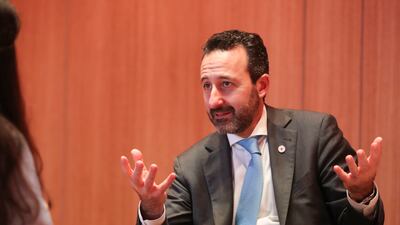Climate change is hitting fragile states including Afghanistan and Yemen hard, exposing millions of people to malnutrition and starvation, a leading official from the International Committee of the Red Cross told The National.
A combination of the Covid-19 pandemic, war, economic crisis and prolonged drought threatens millions of Afghans and Yemenis with food insecurity, a lack of access to basic services, employment opportunities and general security.
The extent of these interlinked crises poses a regional threat. Afghanistan's eastern neighbour Pakistan suffers regular droughts and is expected to take an economic hit as Afghanistan becomes less stable.
“Many countries witnessing armed conflicts now face severe climate change — creating a perfect storm of accumulated and intersecting challenges and making it very difficult for affected communities to recover from these shocks,” said Robert Mardini, the ICRC’s Director General.
“This combined effect crosses borders and requires regional approaches and collaboration to enhance effective climate adaptation action and direct climate finance towards neglected places,” Mr Mardini said.
In Afghanistan the consequences of climate change are hitting the country hard, he told The National during a visit to the UAE.
“There has been an important drought over the last year that has reduced crops and food production, exposing lots of families to acute malnutrition and food insecurity,” he said.
Nearly 30 per cent of the 39 million population in Afghanistan are facing severe food insecurity and half of Afghans today need humanitarian support and protection services in one way or another.
“It’s a challenging situation,” he said.
Similarly, Yemen faces acute water stress. “Yemen's water table is declining by six meters, going down every year in places like the river basin of Saada,” Mr Mardini said, adding that a great deal of investment, including climate finance and climate action is needed.
Afghanistan on the brink
Before the Taliban’s takeover of Kabul in August many Afghans were struggling to feed their families as the country’s economy, health care, and basic services were already on the brink of collapse.
Climate change has made the country’s droughts more frequent and intense. This has forced thousands of poor families to sell their flocks of livestock and flee, seeking shelter and assistance in packed camps near major cities.
“Afghanistan is prone to droughts, floods and maybe flash floods so we need to apply techniques such as taking advantage of satellite imagery and risk analysis maps in order to identify where people live closer to the rivers, to better protect them from instances of floods,” he said.
The ICRC supports people in resisting climate variability, climate risk and climate hazards.
Response in Afghanistan
Mr Mardini said a current problem is that the topic of climate change is only brought to the table when it is “materialising on the ground and hitting communities hard”.
For many communities, climate change was not high on their list of priorities, Mr Mardini said, as they have much greater risks to deal with, especially from continuing armed conflict.
“When you are dealing with immediate life threatening situations, you have less space to think of the longer term things, but when they hit hard it becomes much more visible and it becomes something that people speak about, and the authorities as well,” he said.
The ICRC will double its budget in Afghanistan to meet demand, but Mr Mardini said “it’s only a drop in the ocean” and that a political solution is the only way forward.
“What we can bring to the table is our experience and knowledge of communities that are trying to address the compounded consequences of conflict, climate and Covid-19, the 'triple Cs' and the toxic mix,” Mr Mardini said.
“Out of the 20 countries most affected by climate change, 12 have an active armed conflict today,” he said.
No single organisation or country can address the challenges of the climate crisis alone, he said, and international collaboration is critical for exchanging knowledge and expertise.











